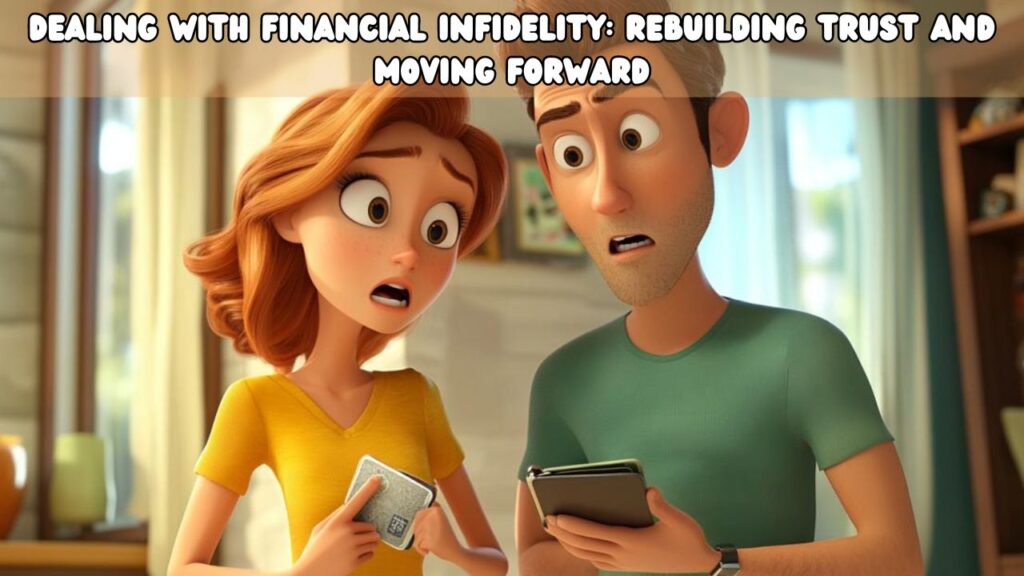Message to Dr. Hart
From: Vanessa
Age: 32
Partner: 35
Duration: 8 years
From: United States
“Hi Dr. Hart, I’m struggling with something that’s really shaken my relationship. My partner and I have been together for 8 years, and I recently found out that he’s been hiding some major financial decisions from me. He took out a personal loan without telling me and has been gambling part of his salary for months. I feel betrayed and confused because we’ve always talked about the importance of being honest with each other. He says he did it because he didn’t want me to worry, but now I don’t know if I can trust him. How can we rebuild trust and move forward after financial infidelity? I don’t want to leave, but I feel lost. Any advice would help.”
Dr. Seraphina Hart’s Response:
Dear Vanessa,
I want to start by acknowledging how incredibly difficult and painful this situation must be for you. Financial infidelity—when one partner hides financial decisions or engages in secretive financial behaviors—can cut deeply, in ways that may be just as damaging as emotional or physical betrayal. When trust is broken, especially in such a fundamental area as finances, it shakes the core of the relationship. You’re left feeling disoriented, hurt, and perhaps even questioning everything you thought you knew about your partner and your shared life. It’s understandable to feel lost and unsure of what to do next.
The truth is, money isn’t just about dollars and cents—it’s about security, trust, and shared dreams. When those are undermined, it can feel as though the ground has shifted beneath your feet. You may wonder how you’ll ever rebuild what’s been broken, or if that’s even possible. These are all valid concerns, and it’s important to recognize that you’re not alone in feeling this way.
But the fact that you’re reaching out for advice shows that you’re committed to finding a way forward. This is an encouraging sign that, despite the hurt, you’re open to healing and want to work toward repairing the relationship. That willingness is the first, crucial step in navigating a path toward trust and reconciliation.
Let’s take some time to carefully unpack the emotions you’re experiencing, understand what financial infidelity really means in the context of a relationship, and explore a roadmap that can help guide you and your partner toward rebuilding the trust that’s been damaged.
While this journey won’t be easy, it is possible to move forward and come out stronger—both as individuals and as a couple. Healing takes time, openness, and effort from both of you, but it starts with a commitment to address the issues and begin the process of recovery. Let’s break down how you can begin to navigate this challenging situation, step by step, in a way that fosters both understanding and healing.
How to Address the Betrayal

You’ve expressed feelings of betrayal, and it’s important to acknowledge and honor those emotions fully. Betrayal in a relationship—whether emotional, physical, or financial—can shatter the foundation of trust and security that a couple has worked hard to build. The trust between you and your partner has been compromised, and this isn’t something that can be brushed aside or handled lightly. It’s critical to face it head-on, addressing both the emotional wounds and the practical aspects of the betrayal. Healing will require open, honest communication, mutual accountability, and a willingness from both of you to engage in the process of rebuilding.
Here’s how you can begin:
Have an Open and Honest Conversation
The first and most essential step is creating a safe space where you and your partner can talk openly. Choose a calm, private environment where both of you can speak without interruptions. The goal is to create an atmosphere of understanding rather than blame, even though it’s natural to feel angry and hurt. These emotions are valid, but expressing them constructively can lead to progress, rather than deepening the divide.
When you begin the conversation, focus on how his actions have affected you, using “I” statements to communicate your feelings. For example, instead of saying, “You’ve ruined our relationship by hiding things from me,” you might say, “I feel deeply hurt and uncertain about our future because of the secrecy around money.” This way, you are sharing your feelings without making accusations that might provoke defensiveness.
This kind of dialogue invites openness, making it easier for your partner to listen without feeling attacked. The goal is not to avoid discussing difficult truths, but to create a space where both of you can express your thoughts and emotions honestly. Financial betrayal often stems from deeper, underlying issues, and this initial conversation should help uncover not just the facts, but the feelings and fears behind the behavior.
Listen to His Side
While your feelings of betrayal and hurt are central to this discussion, it’s equally important to listen to your partner’s side of the story. Financial infidelity rarely happens in a vacuum, and while it doesn’t excuse the behavior, understanding why it occurred can be a key step in moving forward. Did he hide his financial struggles or gambling because of shame, fear of judgment, or a desire to avoid conflict? Or was it rooted in a sense of inadequacy or stress?
As difficult as it might be to hear, try to approach his explanation with empathy. Understanding his motives—whether they were driven by fear, stress, or a misguided attempt to protect you—will provide important insights into his thought process. This doesn’t diminish the pain caused, but it allows you both to understand the broader context of the betrayal, which can help inform how you’ll address it together.
Listening fully doesn’t mean you’re excusing his actions. Rather, it allows for a deeper understanding of where the breakdown occurred, which is essential in creating a foundation for trust moving forward.
Discuss the Future of Your Finances
Once the emotional weight of the situation has been laid out, it’s time to move into practical steps to prevent this kind of breach from happening again. Transparency in finances is critical in any long-term relationship, especially after financial deception. You’ll need to work together to establish clear financial boundaries and systems that both of you agree on. This might include:
- Creating a shared budget: A transparent, joint financial plan ensures that both partners are fully aware of where money is coming from and where it’s going. This prevents financial surprises and fosters open dialogue around spending and saving goals.
- Defining financial boundaries: Discuss what kind of financial behaviors are acceptable in your relationship. For example, you might agree that any large purchases over a certain amount must be discussed beforehand, or that neither partner will take on personal debt without informing the other.
- Keeping each other accountable: Consider regular financial check-ins. Setting a weekly or monthly time to go over your finances can keep both of you involved and aware of your financial situation. This helps to reduce secrecy and creates a sense of partnership around managing money.
Additionally, if gambling or excessive spending is part of the problem, it may be necessary to explore external help, such as consulting a financial advisor or a therapist who specializes in gambling addiction. Seeking professional help together can be a proactive way to address these deeper issues and create a structured plan for financial recovery.
Rebuilding Trust After Financial Deception

Rebuilding trust after financial deception is a long-term process that requires commitment from both of you. There’s no quick fix, and healing will take time, effort, and patience. Here are some concrete steps to guide you as you work to rebuild the trust that’s been broken.
Create a Financial Plan Together
To rebuild trust, you’ll need to approach your finances in a way that is transparent and collaborative. Sit down together and create a clear financial plan that covers your income, expenses, debt, and savings. This isn’t just about managing your money—it’s about creating a system of accountability and trust. By involving each other in all financial decisions, you foster an environment of openness and shared responsibility.
If gambling or unmanaged debt is part of the issue, this plan should include strategies to address those challenges head-on. This could involve setting up limits on discretionary spending, paying down debt together, or even seeking help from a financial advisor who can guide you through creating a sustainable budget. If gambling is an addiction, consider working with a therapist who specializes in that area to help your partner (and the relationship) recover fully.
Establish Regular Financial Check-ins
One effective way to ensure that you’re both staying on track is to set up regular financial check-ins. You could schedule a time each week or month to sit down together and review your finances. This includes going over your budget, reviewing any major expenses, and checking in on financial goals. This regular practice helps to normalize discussions around money, turning them from a source of stress into an opportunity for teamwork. Over time, these check-ins will foster more openness and reduce the likelihood of future secrecy.
By making financial transparency a habit, you both become more invested in managing your money as a team. These check-ins also give you an opportunity to address any issues before they escalate, allowing for smaller adjustments rather than large, hidden decisions.
Take Accountability
For trust to be rebuilt, your partner must take full accountability for his actions. This means acknowledging the emotional and practical damage caused by his financial secrecy. It’s not enough to simply apologize; he needs to show through his actions that he is committed to regaining your trust.
Accountability can take many forms: offering access to financial records, being transparent about spending, and taking steps to address any underlying issues, like gambling or debt. If he has promised to make changes, such as attending therapy or adjusting his financial habits, it’s important that he follows through consistently.
You might also consider setting up temporary boundaries around finances. For example, you might agree that for a time, you’ll take a more active role in managing the household finances while he rebuilds trust. This can be a way for him to demonstrate accountability while also giving you a sense of control during this vulnerable period.
By approaching the betrayal with a combination of emotional honesty, practical steps, and mutual accountability, you and your partner can begin the process of healing. Trust takes time to rebuild, but with consistent effort and openness, it is possible to move forward.
Seek Professional Help If Necessary

Financial infidelity is a deep wound that can erode not only trust but the emotional safety within a relationship. Because it carries such heavy emotional consequences, many couples find it helpful, and often necessary, to seek professional support. While it’s possible to work through these issues on your own, the guidance of a therapist can provide clarity, structure, and a safe environment in which to address the complexities of financial deception.
The Role of a Relationship Therapist
A relationship therapist, especially one experienced in issues of financial betrayal, can help both partners navigate the storm of emotions that come with financial infidelity. A therapist provides a neutral space for you and your partner to express your feelings and frustrations, allowing each of you to be heard without judgment. Therapy can also help you both explore the deeper emotional dynamics at play in your relationship—whether those are rooted in trust, control, or past wounds.
In many cases of financial infidelity, couples fall into patterns of blame, avoidance, or misunderstanding, which can stall healing. A skilled therapist can help break through these cycles, offering tools for better communication and conflict resolution. For example, they may teach you techniques for managing difficult conversations, handling triggers, and creating empathy in moments of tension.
Additionally, therapy can provide a roadmap for how to rebuild trust, offering both short-term and long-term strategies tailored to your unique situation. It’s not just about managing the practical side of finances; it’s also about restoring emotional intimacy and security, so both partners feel safe moving forward.
Addressing Gambling Addiction
If gambling has been a factor in the financial infidelity, it’s critical to address this issue head-on. Gambling can often be more than just a bad habit—it can be an addiction that profoundly affects both the individual and the relationship. If your partner’s gambling behavior has contributed to financial secrecy or debt, consider seeking a therapist or counselor who specializes in gambling addiction.
Treatment for gambling addiction often involves behavioral therapy, which helps individuals identify the triggers that lead to gambling, develop healthier coping mechanisms, and set practical boundaries to avoid falling back into harmful habits. As a couple, you might also explore programs such as Gamblers Anonymous, which offers peer support and guidance for individuals and their loved ones dealing with the challenges of gambling.
Addressing the gambling problem isn’t just about eliminating the behavior—it’s about rebuilding trust and creating an environment where transparency and honesty can thrive. For many couples, a combination of individual therapy (for the gambling partner) and couples therapy is the most effective approach, allowing each person to work on personal challenges while also strengthening the relationship.
Couples Therapy for Healing
Even if gambling is not an issue, financial infidelity alone is often enough to warrant couples therapy. The betrayal caused by financial deception can have far-reaching emotional consequences, such as lingering resentment, loss of intimacy, or difficulty feeling safe in the relationship. A couples therapist can help you navigate these emotional landmines and rebuild your bond in a structured, supportive environment.
Couples therapy also offers the chance to explore deeper patterns of communication and trust that might have contributed to the infidelity. By working through these issues with professional guidance, you’re more likely to emerge from this experience with a stronger foundation, better equipped to handle future challenges together.
Rebuilding Emotional Connection

While rebuilding financial trust is crucial, it’s equally important to nurture the emotional connection that may have been damaged by financial infidelity. In many cases, the betrayal doesn’t just create distrust around money—it can fracture your sense of emotional safety and closeness, leaving you feeling distant from one another. Addressing this emotional distance is key to truly healing and moving forward.
The Importance of Emotional Intimacy
Financial infidelity can introduce feelings of isolation, insecurity, and rejection into a relationship. You may find yourself questioning whether your partner cares about your emotional well-being, or you might feel abandoned in moments when trust was critical. This erosion of emotional intimacy can be just as painful, if not more so, than the financial betrayal itself.
To rebuild emotional trust, you need to focus on strengthening the bond that connects you as partners beyond the logistics of daily life. Emotional intimacy is about feeling seen, heard, and valued by your partner—and providing them with the same in return. It’s about creating a safe space where you can both express your vulnerabilities and receive empathy without judgment.
Practical Ways to Rebuild Emotional Trust
- Spend Quality Time Together: One of the simplest yet most effective ways to reconnect is by carving out time to be fully present with each other. This could be as straightforward as setting aside a regular date night, taking walks together, or simply sitting down at the end of the day to check in emotionally. The goal is to engage in activities that foster closeness and remind you of the love and bond you share outside of the financial issues.
- Openly Share Your Feelings: Transparency in communication is key to rebuilding emotional trust. Make it a point to regularly share how you’re feeling—both the good and the bad. If you’re struggling with lingering resentment or fear, bring it up in a non-accusatory way. Similarly, encourage your partner to share their emotional experiences so you can better understand each other’s internal worlds. When done with care, these vulnerable conversations can lead to deeper emotional intimacy and trust.
- Be Patient with the Healing Process: Rebuilding emotional connection takes time, just like rebuilding trust in other areas. It’s normal to experience setbacks or moments of doubt along the way. Be patient with yourself and your partner as you both work through the emotional fallout. Healing doesn’t happen overnight, but by consistently making the effort to reconnect and communicate, you can gradually rebuild the closeness that was lost.
- Physical Affection and Reassurance: Emotional connection isn’t just built through words—it’s also fostered through small acts of physical affection and reassurance. A hug, holding hands, or even a simple gesture of care can go a long way in reinforcing emotional bonds. These acts remind your partner that you’re there for them, and that despite the challenges, the love and affection in your relationship are still present.
- Work Toward Shared Goals: One powerful way to rebuild emotional trust is to focus on creating and working toward shared goals. Whether it’s planning a vacation, setting future financial targets, or simply dreaming about your life together in the future, these shared aspirations help you both envision a future built on collaboration and mutual care. It reinforces the idea that you’re both working together for a common purpose, which can help to heal any emotional distance.
Dr. Seraphina Hart, PhD, is a relationship therapist with over two decades of experience in the field of psychology and human behavior. With a rich academic background from Stanford University, she has an in-depth understanding of the complexities of interpersonal relationships. Dr. Hart's journey began with a deep fascination with the human mind and how it forms emotional connections, leading her to specialize in relationship therapy.
Her compassionate approach and unique methodology are informed by her extensive study of various therapeutic modalities, including Cognitive Behavioral Therapy (CBT), Emotionally Focused Therapy (EFT), and mindfulness techniques. Dr. Hart believes in the power of empathy and understanding in healing and transforming relationships. With her guidance, clients learn to navigate their emotions, communicate effectively, and foster a deep sense of self-awareness.





You may like
Should I Marry Someone with Debt? Navigating Love, Money, and Future Together
Dealing with an Overbearing Mother-in-Law: How to Set Boundaries Without Harming Your Marriage
How to Apologize Effectively in a Relationship: 7 Steps to Show You Truly Care